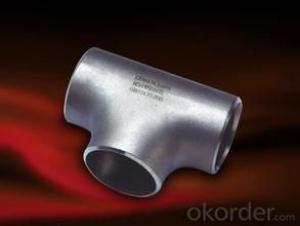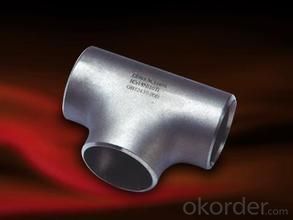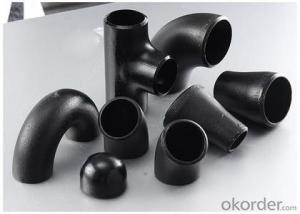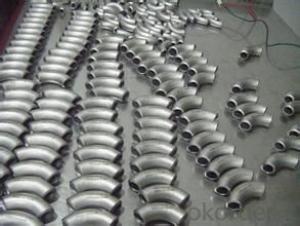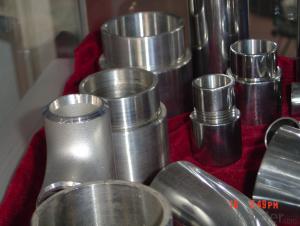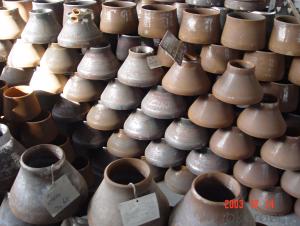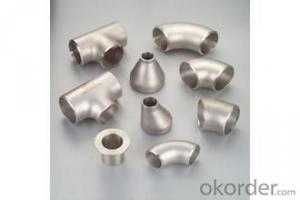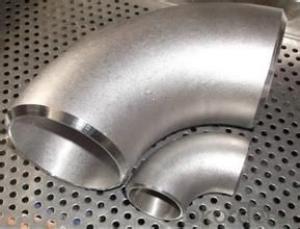STAINLESS STEEL PIPE BUTT WELDED TEE 304/316 ANSI B16.9 good PRICE BEST QUALITY
- Loading Port:
- Tianjin
- Payment Terms:
- TT OR LC
- Min Order Qty:
- 10 m.t.
- Supply Capability:
- 10000 m.t./month
OKorder Service Pledge
OKorder Financial Service
You Might Also Like
Package Of Stainless Steel Butt-Welded Fitting:
PACKED IN PLYWOOD CASES OR PALLETS
Painting Of Stainless Steel Butt-Welded Fitting:
ANTI-RUST OIL
Marking Of Stainless Steel Butt-Welded Fitting:
REFER TO MARKING DOCUMENT or AS PER CUSTOMER REQUEST
Shipping Marks Of Stainless Steel Butt-Welded Fitting:
EACH WOODEN BOX TWO PLASTIC SHIPPING MARKS
Specification Of Stainless Steel Butt-Welded Fitting:
Stainless Steel 90Deg LR Elbow, Tee, Reducer and Cap
Size : 1/2"-48"
Wall Thickness.: SCH10-SCH160, SGP , XS, XXS, DIN ,STD
| Name | Stainless Steel Butt-Welded Fitting |
| Size | 1/2" - 48" |
| ANGLE | 45D 90 D 180D |
| Wall thickness | Sch5-Sch160 XXS,STD,XS, SGP |
| Standard | ASME B16.9, GOST 17375-2001, DIN2605 and JIS B2311, EN10253-1 etc. |
| We can also produce according to drawing and standards provided by customers. | |
| Material | 304, 304L, 316, 316L, 304/304L, 316/316L, EN1.4301, EN1.4404 etc. |
| Packaging | Wooden Cases, wooden pallet , or carton box , or nylog bag and then in wooden cases |
| Surface Treatment | Anti-rust Oil |
| Delivery Time | 20-30 days, after received advance payment. |
| Quality | 100% Heat Treatment, No Welding repair |
| Others | 1.Special design available according to your drawing. |
| 2.anti-corrosion and high-temperature resistant with black painting | |
| 3. All the production process are made under the ISO9001:2000 strictly. | |
| 4. A conformity rate of ex-factory inspection of products. | |
| 5. we have export right , offering FOB , CNF CIF price |
STANDARD & MATERIAL GRADE
STANDARD Of Carbon Steel Butt-Welded Fitting
| Standard | Wall Thickness | Type | |
| American Standard | ASME B16.9 | S5S ~ XXS | 45D, 90D, 180D ELBOW, TEE, REDUCER, CAP, STUB END |
| ASME B16.11 | |||
| ASME B16.28 | 90D SR ELBOW | ||
| Japanese Standard | JIS B2311 | SGP ~ LG |
MATERIAL Of Stainless Steel Flange
| Stainless Steel | ||
| Material Standard | Material Grade | |
| ASTM | ASTM A182 | F304 / F304 L |
| ASTM A182 | F316/ F316L | |
| ASTM A182 | F310, F321 | |
| ASTM A182 | F321 | |
| DIN EN | DIN EN 10222-5 | EN 1.4301 |
| DIN EN 10222-5 | EN 1.4404 | |
| JIS | JIS G3214 | SUS F304 |
| JIS G3214 | SUS F304L | |
| JIS G3214 | SUS F316 | |
| JIS G3214 | SUS F316L | |
- Q: Does the seamless steel pipe need rust removal?
- The main use of steel wire brush and other tools to polish the surface of the steel, you can remove loose or tilted skin, rust, welding slag and so on. Manual tool derusting can reach Sa2 level, power tools derusting can reach Sa3 level, if the surface of the steel attached to the solid oxide sheet, tool rust removal effect is not ideal, can not reach the corrosion protection requirements of the anchor depth.
- Q: How do steel pipes handle extreme temperatures?
- Steel pipes are highly durable and can handle extreme temperatures due to their inherent strength and heat resistance. They have a high melting point, allowing them to withstand both very high and very low temperatures without compromising their structural integrity. Additionally, steel pipes have excellent thermal conductivity, which enables them to efficiently transfer heat and prevent damage caused by extreme temperature fluctuations.
- Q: What are the common applications of galvanized steel pipes?
- Galvanized steel pipes are commonly used in various industries and applications such as plumbing, water supply systems, gas pipelines, electrical conduits, construction projects, fencing, and outdoor structures. The galvanization process adds a protective zinc coating to the steel, making it resistant to corrosion and extending its lifespan, making it ideal for applications requiring durability and longevity.
- Q: How are steel pipes used in the manufacturing of storage tanks?
- Steel pipes are commonly used in the manufacturing of storage tanks due to their high strength, durability, and resistance to corrosion. These pipes are typically used as the main structural component of the tank, providing the necessary strength to support the weight of the stored materials. Additionally, steel pipes can be easily welded together, allowing for the construction of large, seamless tanks that can hold various liquids or gases. Overall, steel pipes play a crucial role in ensuring the integrity and longevity of storage tanks.
- Q: What is the creep resistance of steel pipes?
- The ability of steel pipes to withstand deformation or elongation over time when exposed to high temperatures and constant stress is referred to as their creep resistance. Steel pipes are highly regarded for their exceptional resistance to creep because of the inherent strength and stability of the material. The creep resistance of steel pipes can vary depending on factors like the composition of the alloy, heat treatment, and the conditions in which they are used. Creep is a phenomenon that occurs at elevated temperatures, causing materials to slowly deform under constant stress. In the case of steel pipes, this can be a concern in applications where they are subjected to high temperatures for extended periods, such as in power plants, industrial furnaces, or steam pipelines. The ability to resist creep deformation is crucial to maintain the structural integrity and longevity of the pipes. Steel pipes are often designed and manufactured using alloys with high creep resistance properties, such as chromium-molybdenum (Cr-Mo) steels or nickel-based alloys. These alloys possess excellent mechanical strength, thermal stability, and resistance to oxidation and corrosion, all of which contribute to their superior creep resistance. Moreover, heat treatment processes like quenching and tempering can significantly enhance the creep resistance of steel pipes. These treatments involve controlled heating and cooling cycles to optimize the microstructure of the steel, thereby increasing its resistance to deformation and improving its overall performance at high temperatures. It is important to note that the creep resistance of steel pipes is typically specified by industry standards and codes, such as the American Society of Mechanical Engineers (ASME) Boiler and Pressure Vessel Code. These standards define the allowable stress levels and design criteria for different steel pipe applications, ensuring that they meet the necessary safety and performance standards. In summary, steel pipes are renowned for their excellent creep resistance due to their inherent strength, stability, and ability to withstand high temperatures. The specific creep resistance of steel pipes may vary depending on factors such as alloy composition, heat treatment, and operating conditions. Proper design and adherence to industry standards are essential to ensure the desired creep resistance and overall performance of steel pipes in various applications.
- Q: Can steel pipes be used for electrical conduits?
- No, steel pipes cannot be used for electrical conduits. Electrical conduits need to be made of materials that are non-conductive and provide protection for the electrical wiring. Steel is a conductive material, so it poses a risk of electric shock and can cause interference with the electrical signals.
- Q: Hot galvanized steel pipe for use?
- Hot galvanized pipe: in order to improve the corrosion resistance of steel pipe, galvanized steel pipe. Galvanized steel pipe hot galvanized and galvanized two kinds, hot galvanized, zinc coating thickness, zinc plating cost is low, the surface is not very smooth.The hot-dip galvanized pipe is an alloy layer that causes molten metal to react with the iron matrix, thus combining the substrate with the two coating. Hot dip galvanizing is the first steel pickling, in order to remove iron, steel pipe surface after pickling, cleaning by ammonium chloride or zinc chloride solution or ammonium chloride and zinc chloride aqueous solution tank, and then into the hot dip tank. Hot galvanizing has the advantages of uniform coating, strong adhesion, long service life and so on. A complex physical and chemical reaction is formed between the steel tube matrix and the molten plating solution to form a corrosion resistant structure with a tight zinc - iron alloy layer. The alloy layer is integrated with the pure zinc layer and the steel pipe matrix. Therefore, it has strong corrosion resistance.
- Q: Can steel pipes be used for conveying slurry?
- Yes, steel pipes can be used for conveying slurry. Steel pipes are commonly used in industries such as mining, dredging, and wastewater treatment, where slurry - a mixture of solid particles and liquid - needs to be transported. Steel pipes offer high strength, durability, and resistance to abrasion, making them suitable for handling the abrasive nature of slurry. Additionally, steel pipes can be lined or coated with materials such as rubber or ceramic to further enhance their resistance to wear and corrosion, making them a reliable choice for conveying slurry.
- Q: How are steel pipes used in bridge construction?
- Steel pipes are commonly used in bridge construction as piling or foundation elements. They are driven into the ground to provide support and stability to the bridge structure. Additionally, steel pipes can be used as structural members in the bridge's superstructure, such as for the construction of bridge piers or trusses, due to their high strength and durability.
- Q: Welded and seamless steel pipe how to distinguish?
- Different uses:Mainly used for seamless pipe or structural parts of the transmission fluid, mainly used in machinery industry, and seamed steel pipe is mainly used in the construction industry, such as water, gas, compressed air and low pressure fluid. But seamless steel tubes are used in all pressure pipes.
Send your message to us
STAINLESS STEEL PIPE BUTT WELDED TEE 304/316 ANSI B16.9 good PRICE BEST QUALITY
- Loading Port:
- Tianjin
- Payment Terms:
- TT OR LC
- Min Order Qty:
- 10 m.t.
- Supply Capability:
- 10000 m.t./month
OKorder Service Pledge
OKorder Financial Service
Similar products
Hot products
Hot Searches
Related keywords
